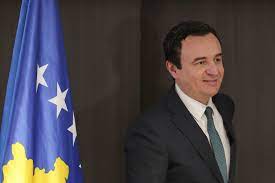PRISTINA, Kosovo (AP): Kosovar Prime Minister Albin Kurti called on Western powers not to pressure his tiny Balkan country into accepting a contentious association of five Serb-majority municipalities that is ramping up tensions between Kosovo and Serbia.
Kurti told The Associated Press that the focus instead should be on making Serbia more democratic and getting rid of what he called Belgrade’s hegemonistic ideas.
Kurti said in the interview on Sunday that the Serbian government should acknowledge the independence of all the ex-republics of former Yugoslavia in order to “face the past.” He stressed that Belgrade should lean more toward the European Union and NATO, not Russia.
The prime minister said that if they free themselves from the idea that Kosovo still belongs to Serbia, “they will be much more democratic, European.”
During the past several weeks, U.S. and EU envoys have visited Pristina and Belgrade to encourage them to accept a new proposal for the two countries to normalize relations and boost their EU accession bids.
A EU-mediated Kosovo-Serbia dialogue has been ongoing since 2011, but few of the 33 signed agreements have been implemented.
Kurti said the negotiations so far were “a problem-solving ideology … every solution became ever more complicated, ever less implementable, and the public lost interest.” He considered the new proposal “a good framework and platform for moving forward … which makes us hopeful about the prospects of future talks and an agreement.”
The United States has increased pressure on Pristina to implement a 2013 agreement to establish the Association of Serb-Majority Municipalities, which would coordinate work on education, health care, land planning and economic development at the local level. In 2015, Kosovo’s Constitutional Court later declared part of the plan unconstitutional, ruling that it wasn’t inclusive of other ethnicities and could entail the use of executive powers.
Kurti says the establishment of the association isn’t his priority, and last week he set conditions saying it can only be formed as part of an overall agreement on the normalization of relations, which Serbia has rejected in the past. Kosovo authorities fear it would eventually undermine the country’s statehood with the help of Belgrade.
Western powers should learn from the example of Bosnia’s Serb-run ministate Republica Srpska, fearing the creation of a ministate in Kosovo, he said, adding that Belgrade used the creation of the association “as a weapon against our independence.”
“If we introduce in the Western Balkans the idea of ethnically based association of municipalities, that’s a recipe for new conflicts,” Kurti said.
The Western powers should not to impose pressure on smaller countries like Kosovo, which are democratic, he said. The problems between Kosovo and Serbia might be small and annoying, but they should pay attention to what has been going on in the region because “any kind of wrong solution in the Balkans can and will be used elsewhere.”
Mutual recognition is the centerpiece of any negotiation process, he insisted, something that Belgrade harshly turns down.
The dispute between Serbia and its former province of Kosovo has remained a source of instability in the Balkans long after the 1998-99 war, which ended with a NATO intervention that forced Serbia to pull out of the territory.
Kosovo in 2008 declared independence from Serbia, which Belgrade has refused to recognize, supported by Russia and China. The U.S. and most EU nations have recognized Kosovo.







